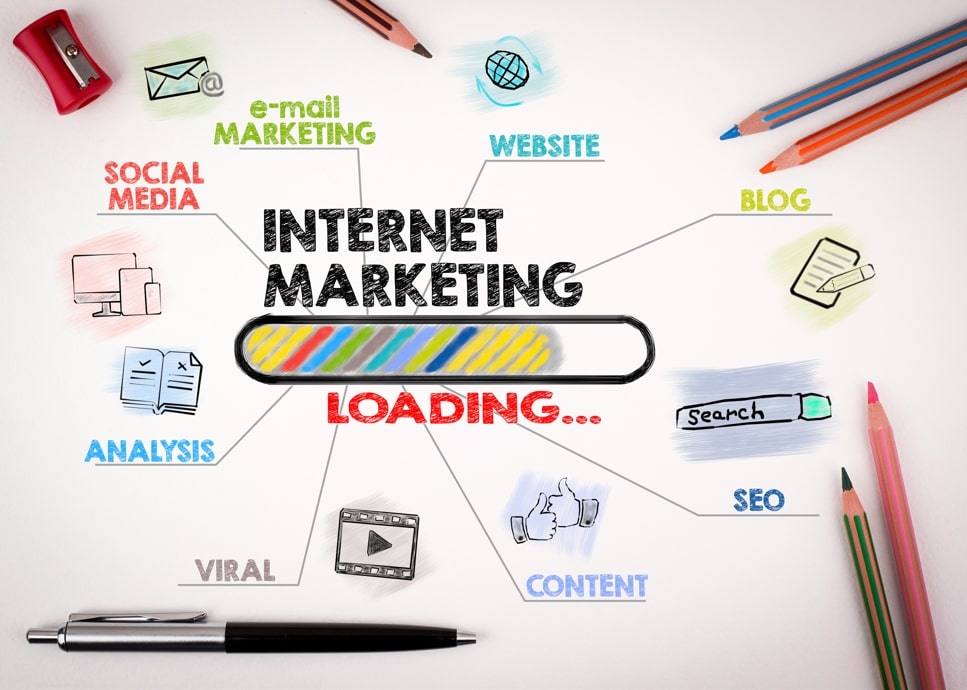Understanding and building strong relationships with your customers is what CRM helps you achieve. Acting as both a tool and a strategy, CRM helps businesses organize customer data, track engagement, and improve communication—all crucial elements for modern digital marketing campaigns.
As digital marketing grows more data-driven, integrating CRM into your strategy allows you to segment audiences, personalize campaigns, and track their performance with precision. Whether you’re running targeted email campaigns, managing social media engagement, or analyzing customer behavior, CRM ensures your efforts are smarter, more focused, and more effective.
But what exactly does CRM mean in the context of digital marketing, and how can businesses harness its power? Let’s start with the basics.
What is CRM in digital marketing?
CRM in digital marketing refers to the strategic use of Customer Relationship Management systems and practices to enhance marketing efforts. At its core, a CRM is a platform or tool that stores and organizes customer information, such as purchase history, interactions, preferences, and demographic details. When integrated with digital marketing, CRMs become central hubs for collecting, analyzing, and using customer data to drive smarter marketing decisions.
Unlike traditional marketing tools, CRM doesn’t just store customer data; it allows marketers to:
- Segment and target audiences based on behavior, interests, or previous engagement.
- Personalize content and campaigns, increasing relevance and response rates.
- Streamline workflows through automation, ensuring efficiency in repetitive marketing tasks like email sequences or lead nurturing.
- Track customer journeys across multiple digital channels like social media, email, or websites.
With CRM integration, digital marketing shifts from being generic and reactive to data-driven and proactive, helping businesses engage the right customers at the right time. This strategy enables marketers to identify key opportunities, improve conversion rates, and foster loyalty through a deeper understanding of their audience.
While CRM is widely recognized as a sales tool for managing leads and closing deals, its role in digital marketing goes beyond transactions. In sales, the focus is primarily on tracking leads through the sales funnel. However, in digital marketing, CRM enhances:
- Audience Insights: By analyzing customer behaviors, such as past purchases, clicks, or preferences.
- Campaign Execution: Automating outreach efforts and ensuring campaigns are data-backed.
- Engagement & Retention: Strengthening long-term relationships by providing personalized, relevant content and experiences.
See SMO in action
Try our solutions with zero commitment
Benefits of using CRM in digital marketing
Incorporating a CRM system into your digital marketing strategy delivers numerous advantages, from improving campaign targeting to boosting customer retention. By leveraging the power of CRM, businesses can enhance their digital marketing efforts and ensure a more streamlined, data-driven approach. Here are the key benefits:

Improved customer segmentation and targeting
A CRM system enables businesses to segment their customer base using specific criteria such as demographics, buying behavior, and past interactions. Instead of sending generic messages, marketers can tailor content and campaigns to meet the needs of each segment, increasing relevance and engagement.
- For example, an eCommerce brand can target repeat customers with loyalty rewards and tailor product suggestions for new visitors.
Enhanced personalization and engagement
Personalization is no longer a luxury; it’s an expectation. A CRM helps businesses track and analyze customer preferences, purchase history, and past interactions, enabling highly personalized campaigns.
- Marketers can send personalized email offers, customize website experiences, and run dynamic ads based on user behavior, resulting in higher engagement and stronger connections.
Increased efficiency through automation
CRM tools automate repetitive marketing tasks like email workflows, follow-ups, and data entry. This frees up time for marketers to focus on strategy and creativity while ensuring campaigns run smoothly.
- For example, automated emails can be sent to users who abandon their shopping carts, encouraging them to complete their purchase.
Better campaign analytics and performance tracking
CRM systems provide robust analytics that give marketers deeper insight into campaign performance. You can measure KPIs like open rates, click-through rates, conversion rates, and ROI.
- These metrics help identify what’s working, refine strategies in real-time, and allocate budgets to the most effective channels.
Improved customer retention and loyalty
By tracking customer interactions and purchase histories, CRM helps businesses identify opportunities for re-engagement. Sending timely reminders, special discounts, or content tailored to a user’s interest fosters loyalty and reduces churn rates.
In short, integrating CRM with digital marketing helps businesses stay connected with their audience, refine their messaging, and maximize results—all while saving time and resources.
Key features of a CRM for digital marketing
To leverage CRM effectively for digital marketing, it’s essential to understand the features that make it a valuable tool. Here are the key features that enhance marketing efforts:
Tools for email and campaign automation
Email marketing remains a key driver of engagement and sales in digital marketing. CRM systems automate email campaigns, making them more efficient and personalized. Marketers can:
- Set up trigger-based workflows (e.g., welcome emails, cart abandonment follow-ups).
- A/B test subject lines, content, and CTAs for optimized performance.
- Track open rates, click rates, and conversion data to measure success.
Data-Driven insights and customer behavior tracking
One of the strongest features of a CRM is its ability to analyze large volumes of customer data. CRMs can monitor:
- Website interactions: page views, time on site, and clicks.
- Purchasing behavior and patterns.
- Engagement with emails, social media, and other campaigns.
These insights allow marketers to understand their audience’s journey, predict behaviors, and adjust campaigns accordingly for better results.
Social media integration and omnichannel management

A modern CRM integrates seamlessly with social media platforms, ensuring brands maintain a consistent message across all digital channels. With social media CRM features, you can:
- Schedule posts and manage engagements across multiple platforms.
- Track social media ad performance and analyze ROI.
- Monitor user interactions, mentions, and feedback in real-time.
This omnichannel approach ensures customers have a seamless experience, whether they interact via email, social media, or a website.
Advanced reporting and analytics dashboards
CRM systems offer built-in dashboards that aggregate and display marketing data in clear, visual formats. Marketers can:
- Measure KPIs like conversion rates, sales from marketing campaigns, and lead quality.
- Generate custom reports that align with specific marketing goals.
- Use predictive analytics to identify trends and make data-backed decisions.
The reporting capabilities of a CRM ensure that every marketing campaign is measurable, making it easier to demonstrate ROI and improve future performance.
By combining automation, personalization, and data-driven insights, the features of a CRM allow marketers to design, execute, and optimize campaigns with precision. Whether through email workflows, customer analytics, or seamless omnichannel strategies, CRMs act as the backbone of a highly efficient and results-driven digital marketing strategy.
See SMO in action
Try our solutions with zero commitment
How CRM enhances specific digital marketing channels
A well-integrated CRM system is not limited to data storage; it empowers marketers to improve efficiency and results across various digital marketing channels. By connecting customer insights with targeted actions, CRMs allow businesses to optimize campaigns and enhance customer experiences. Below are the main channels that benefit significantly from CRM integration:
Email marketing
Email marketing thrives on segmentation and personalization, and this is where CRM systems excel. By analyzing customer behavior, purchase history, and preferences, CRMs allow marketers to:
- Segment Audiences: Group contacts based on criteria such as demographics, interests, or engagement levels.
- Automate Email Workflows: Create triggered email sequences, such as welcome emails, cart abandonment reminders, and post-purchase follow-ups.
- Personalize Content: Send tailored recommendations and offers that resonate with each recipient, increasing open rates and conversions.
For example, an online clothing store can use CRM data to send personalized product suggestions based on previous purchases and browsing behavior.
Social media marketing
CRM systems integrate seamlessly with social media platforms, enabling businesses to:
- Engage Audiences: Track social interactions, comments, and mentions to foster stronger relationships.
- Target Ads More Effectively: Use CRM data to create custom and lookalike audiences for paid social ads, increasing ROI.
- Monitor Campaign Performance: Analyze metrics like reach, engagement, and conversions to improve ad effectiveness.
This integration ensures that your social media strategy aligns with your customer data, resulting in more meaningful engagement and improved targeting.
Content marketing

A CRM system enhances content marketing by providing insights into what type of content resonates with different customer segments. This allows marketers to:
- Identify topics and formats that perform best.
- Recommend tailored content, such as blogs, eBooks, or videos, to specific audiences.
- Track user engagement with content to measure its impact on the customer journey.
For instance, a business-to-business (B2B) software company might use CRM insights to deliver case studies to leads further along the funnel and blog posts to top-of-funnel prospects.
PPC
CRMs play a vital role in improving the ROI of paid ad campaigns. They enable marketers to:
- Optimize Audience Targeting: Use CRM data to target specific segments with tailored offers.
- Retarget Leads: Deliver ads to users who interacted with your business but did not convert.
- Measure Ad Impact: Track customer interactions before and after ads to determine campaign effectiveness.
For example, an eCommerce brand can target ads promoting a loyalty discount to customers who haven’t purchased in a while, driving re-engagement and sales.
By aligning customer insights with these key channels, a CRM system ensures that marketing efforts are more targeted, efficient, and results-driven, helping businesses maximize engagement and conversions.
Selecting the right CRM for digital marketing
Choosing the right CRM system is crucial to fully unlocking its potential in digital marketing. With so many options available, understanding your needs and evaluating platforms will help you make the right choice.
Factors to consider when choosing a CRM
- Ease of Use: Ensure the CRM interface is user-friendly for your team to adopt and use efficiently. Tools with intuitive dashboards and drag-and-drop features streamline the experience.
- Integration Capabilities: The CRM should integrate seamlessly with tools you already use, such as email marketing platforms, social media management tools, eCommerce systems, and analytics platforms.
- Scalability: Choose a CRM that grows with your business. It should support increasing contacts, larger teams, and advanced features as your needs expand.
- Reporting and Analytics: Look for advanced reporting options that allow you to measure the performance of your campaigns, track ROI, and gain actionable insights.
- Cost: Consider your budget and explore pricing plans, ensuring the features you need are included. Some CRMs, like HubSpot or Zoho, offer free plans with basic capabilities.
Comparison of popular CRMs for digital marketing
Here are some leading CRM platforms and their key features for digital marketing:
- HubSpot CRM
- Best for small to mid-sized businesses.
- Offers marketing automation, email tracking, lead nurturing, and advanced reporting tools.
- Salesforce CRM
- Ideal for larger businesses and enterprises.
- Provides robust integrations, AI-driven insights, and customizable workflows for complex marketing needs.
- Zoho CRM
- Affordable and scalable solution suitable for small businesses.
- Includes email automation, segmentation tools, and social media integrations.
- ActiveCampaign CRM
- Known for its powerful automation capabilities.
- Excellent for personalized email marketing campaigns and audience segmentation.
- Pipedrive
- Focuses on sales-driven marketing efforts.
- Streamlined design for managing leads and tracking campaigns effectively.
Evaluating the right CRM for your business
Before finalizing your CRM, evaluate it based on the following:
- Trial Runs: Take advantage of free trials to test the features and ease of use.
- Customization Options: Ensure the CRM allows you to tailor its capabilities to meet your marketing needs.
- Customer Support: A platform with responsive support and detailed documentation will help resolve challenges quickly.
- Reviews and Case Studies: Check user reviews and success stories to see how other businesses in your industry have used the CRM effectively.
Ultimately, the right CRM will align with your business goals, integrate seamlessly into your digital marketing strategy, and provide tools to deliver measurable results.
Implementing CRM for digital marketing

Successfully implementing a CRM system into your digital marketing strategy requires a structured approach. By ensuring seamless integration and team adoption, you can unlock the full potential of CRM tools. Here’s a step-by-step guide:
Integrate the CRM into your digital marketing workflow
Start by connecting your CRM to the digital tools and platforms you currently use:
- Email Marketing Platforms: Tools like MailChimp, HubSpot, or ActiveCampaign integrate easily with CRMs for automated workflows and audience segmentation.
- Social Media Management Tools: Integrate your CRM with platforms like Hootsuite or Buffer to synchronize customer insights and interactions.
- Website and Landing Pages: Use CRM integrations to capture form submissions, track visits, and engage users with personalized content.
- Paid Ad Platforms: Connect the CRM with Google Ads or Facebook Ads to enhance targeting through segmentation and remarketing.
Integration ensures data flows seamlessly across all channels, creating a cohesive ecosystem for marketing campaigns.
Ensure smooth data migration
If you’re transitioning from another tool or manually collecting data, carefully migrate customer information into your CRM. To avoid data inconsistencies:
- Clean up the database by removing duplicate, outdated, or incomplete data.
- Use CRM migration tools or enlist support from the provider to ensure seamless data transfer.
- Organize customer information, such as contact details, purchase history, and engagement records, into appropriate categories.
Train your team for CRM adoption
A CRM system is only effective when your team fully adopts and understands it. Conduct comprehensive training to:
- Explain how CRM features align with your digital marketing goals.
- Teach teams to automate workflows, pull reports, and analyze customer insights.
- Address any concerns through onboarding sessions or access to learning resources, such as tutorials and documentation.
The goal is to empower your marketing team to make the most of the CRM’s capabilities.
Set clear goals and KPIs
Implementing a CRM requires tracking performance against measurable goals. Establish Key Performance Indicators (KPIs) such as:
- Email open rates, click-through rates, and conversions.
- Customer acquisition cost (CAC) and customer lifetime value (CLV).
- Lead generation, pipeline tracking, and ROI for campaigns.
Use the reporting and analytics dashboards within your CRM to monitor progress and identify trends that help refine your marketing approach.
Monitor and optimize performance
Once implemented, continuous optimization is key. Use data insights from the CRM to:
- Test different marketing approaches through A/B testing.
- Identify areas of opportunity, like high-performing email content or untapped customer segments.
- Update workflows and automation rules as customer needs evolve.
Regular monitoring ensures that your CRM delivers results and remains aligned with your digital marketing strategy over time.
See SMO in action
Try our solutions with zero commitment
Challenges in using CRM for digital marketing
While CRMs bring incredible benefits to digital marketing, businesses often face challenges during implementation and day-to-day use. Here’s how to identify and overcome common obstacles:
Data silos and fragmented information
Challenge: When customer data is spread across multiple tools or systems, marketers struggle to get a unified view of their audience.
Solution: Integrate all marketing platforms (email, social media, website analytics) with your CRM. Many CRMs, like HubSpot and Salesforce, offer third-party integrations to create a single, centralized database.
Poor team adoption
Challenge: If your marketing team doesn’t fully embrace the CRM, its potential remains untapped.
Solution: Conduct proper onboarding and training. Highlight the tangible benefits of CRM adoption, such as automating repetitive tasks, accessing customer insights, and optimizing campaigns to save time. Involve team members in platform customization to build familiarity and ownership.
Overwhelming amount of data
Challenge: CRM systems generate large amounts of data, and without proper organization, it’s easy to get overwhelmed.
Solution: Define specific metrics to monitor and filter irrelevant data. Use CRM dashboards to focus on high-priority KPIs, such as email campaign performance, lead conversion rates, and customer engagement trends.
Technical complexity
Challenge: Some businesses lack the technical expertise to integrate or customize a CRM effectively.
Solution: Choose CRMs with user-friendly interfaces and low-code/no-code customization options. For advanced setups, partner with a CRM consultant or provider for technical support.
Low-Quality or inaccurate data
Challenge: Outdated or incorrect customer data reduces the effectiveness of campaigns and skews reports.
Solution: Regularly clean and update CRM data. Encourage teams to validate information during customer interactions, and implement automation tools to keep data current.
By addressing these challenges proactively, businesses can maximize the value of their CRM systems, ensuring their digital marketing strategies remain efficient, insightful, and results-driven.
Conclusion
In today’s fast-paced and data-driven digital marketing landscape, a CRM system is no longer just a supporting tool—it’s the backbone of an effective and results-oriented strategy. From helping businesses better understand their audiences to automating workflows, segmenting campaigns, and delivering personalized communication, CRM tools have transformed the way businesses engage with customers across digital channels.
By implementing a well-integrated CRM system, businesses can:
- Streamline their digital marketing efforts.
- Gain actionable, data-driven insights.
- Enhance customer relationships through tailored experiences.
- Optimize their campaigns for maximum return on investment.
While challenges like fragmented data, team adoption, and technical complexities may arise, choosing the right CRM, providing proper training, and continuously refining your processes will help you unlock its full potential.
In short, CRM tools bridge the gap between data and action, turning customer insights into measurable success. Whether you’re a small business exploring ways to reach new customers or a larger enterprise fine-tuning campaigns, integrating CRM into your digital marketing strategy is an investment that pays off in engagement, conversions, and long-term growth.


